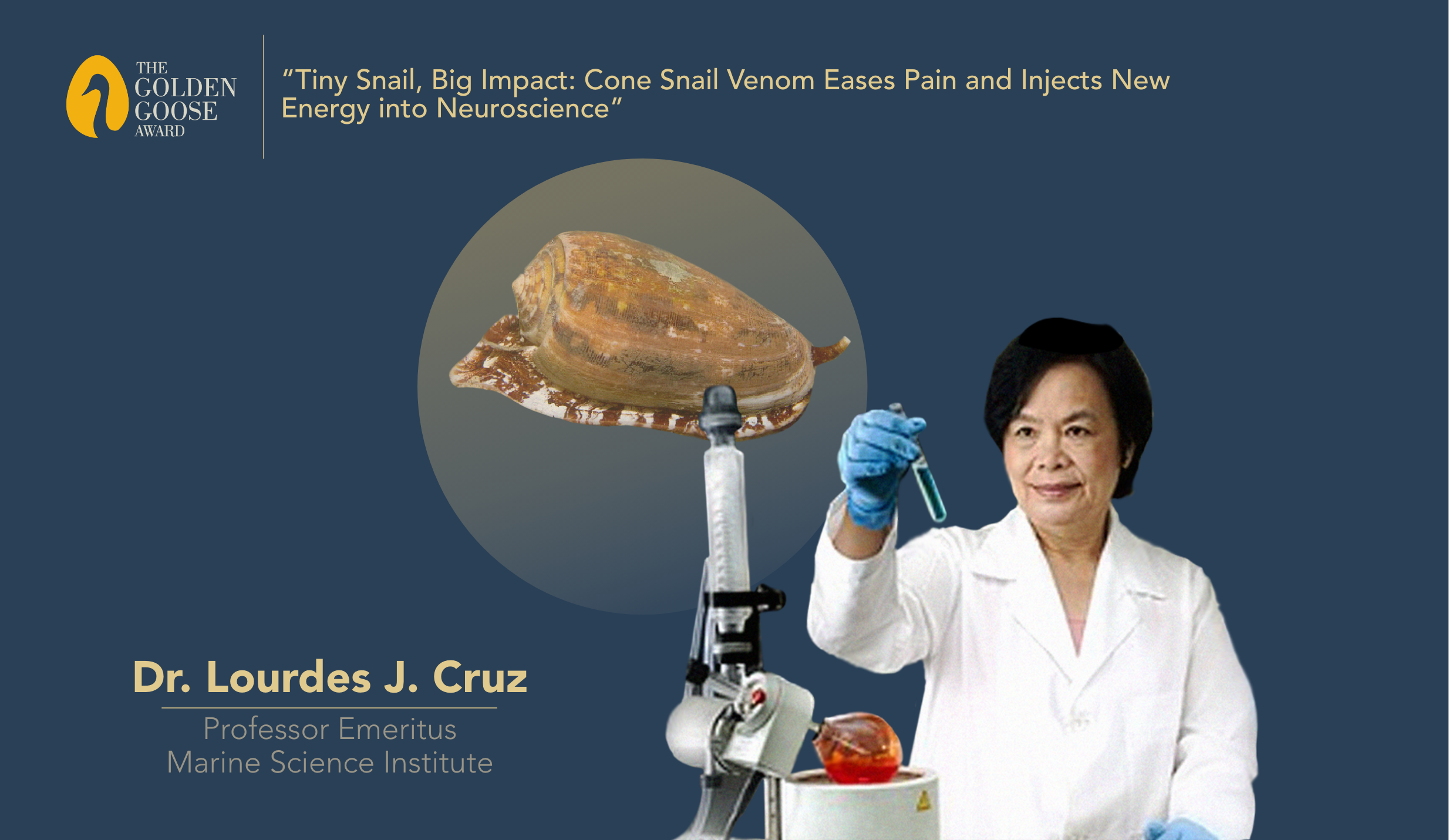Conotoxin research wins 2022 Golden Goose Award
Featured Photo: 2022 Golden Goose Award: UP MSI Scientist Dr. Lourdes J. Cruz
UP MSI Scientist Dr. Lourdes J. Cruz and fellow conotoxin researchers have been awarded the 2022 Golden Goose Award, a United States award that celebrates the initially dubious research ventures that have turned out to be major breakthroughs. The award was presented by the American Association for the Advancement of Science (AAAS) during the 11th annual Golden Goose Award ceremony on September 14, 2022.
Another internationally renowned Filipino biochemist, Dr. Baldomero “Toto” Olivera, received the award alongside Dr. Cruz. Other members of the lauded conotoxin team are the late Craig Clark and Dr. Michael McIntosh.
Not just a wild chase
The Golden Goose Awards has an interesting history. It was conceived as a response to the Golden Fleece Award, which was US Senator William Proxmire’s approach to calling attention to what was deemed ‘superfluous’ or ‘reckless’ spending of government money. It was given 168 times from 1975–1988, subjecting many misunderstood federally-funded scientific projects to undue ridicule.
Nine organizations, including the AAAS, came together in 2012 to present the first set of Golden Goose Awards. Since then, it has recognized 33 major projects in medicine, psychology, the physical sciences, computing, and biology.
Conotoxin research efforts have been funded by the US Department of Defense and National Institutes of Health. The other two recipients of the award this year are the teams behind the Foldscope and bladeless LASIK, respectively.
A new perspective on toxins
Conotoxins are a class of neurotoxic compounds isolated from cone snail venom. Intrigued by how the sting selectively affects neuromuscular activity, Dr. Cruz and her colleagues explored its biochemical applications.
The work began in the 70s when Dr. Cruz was Assistant Professor in the University of the Philippines Manila. Together with Dr. William Gray and Dr. Olivera, Dr. Cruz published a paper on the biochemical characterization of ɑ-conotoxin GI isolated from Conus geographus venom. This 1978 paper was succeeded by publications describing the μ-conotoxins, which block the sodium channels of our tissues.
Since then, research has expanded to include the ω-conotoxins that impede synaptic transmissions, and the conotoxins have been established as reliable reagents for neuroscience and medicine.
Dr. Cruz’s contributions to biochemistry and biomedical research have earned her many accolades, but her advocacies are what set her apart. For Dr. Cruz, science always had a purpose.
This recognition serves as encouragement for other Filipino scientists to continue their passionate work in the basic sciences.
1. Swenson, H. (2022). Tiny Snail, Big Impact: Cone Snail Venom Eases Pain and Injects New Energy into Neuroscience — The Golden Goose Award. The Golden Goose Award. Retrieved 19 September 2022, from https://www.goldengooseaward.org/01awardees/snails.
2. History — The Golden Goose Award. The Golden Goose Award. (2022). Retrieved 19 September 2022, from https://www.goldengooseaward.org/history.
3. Olivera, B. M., & Cruz, L. J. (2001). Conotoxins, in retrospect. Toxicon (Oxford), 39(1), 7-14.
4. Cruz, L. J., Gray, W. R., & Olivera, B. M. (1978). Purification and properties of a myotoxin from Conus geographus venom. Archives of Biochemistry and Biophysics, 190(2), 539-548.

